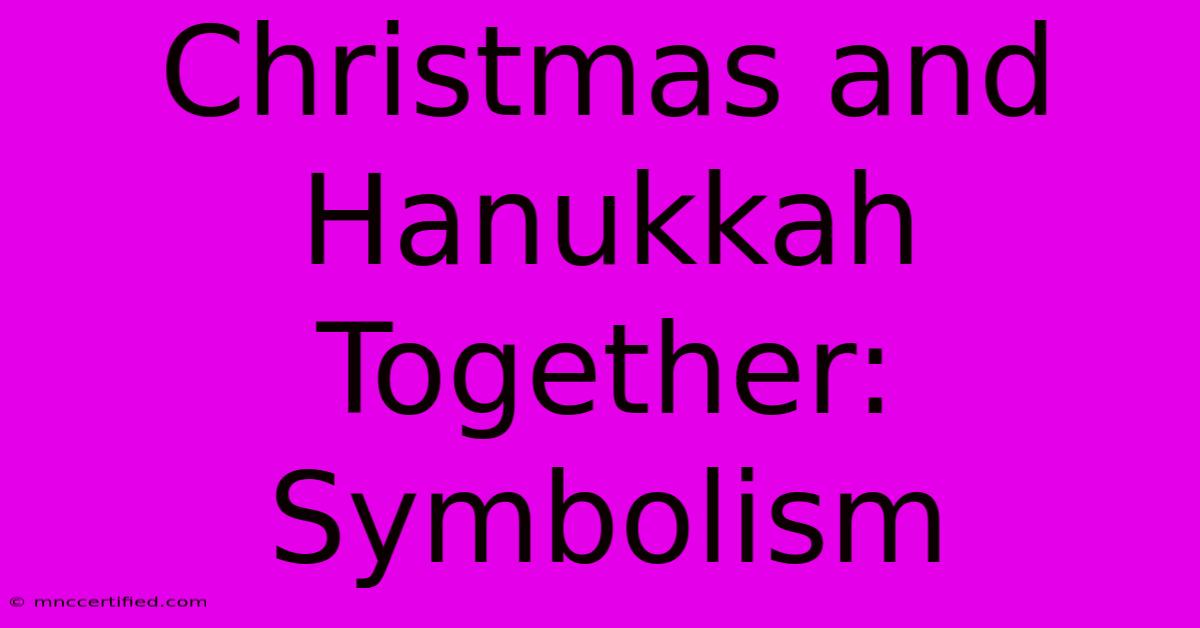Christmas And Hanukkah Together: Symbolism

Table of Contents
Christmas and Hanukkah Together: A Convergence of Symbolism
The holiday season often sees the intertwining of Christmas and Hanukkah, two distinct festivals brimming with rich symbolism, celebrated almost concurrently. While their origins and religious contexts differ significantly, exploring their shared themes reveals a surprising convergence of meaning, particularly around light, hope, and family. Understanding these parallels can enrich the celebratory experience for both Christians and Jews, fostering mutual respect and appreciation for diverse cultural traditions.
Shared Symbolism: Light and Hope
Both Christmas and Hanukkah revolve around the powerful symbol of light. Christmas celebrates the "light of the world," Jesus Christ, whose birth is seen as a beacon of hope and salvation. The Christmas tree, adorned with twinkling lights, visually represents this spiritual illumination, while candles on the nativity scene symbolize the divine light entering the world.
Hanukkah, the "Festival of Lights," commemorates the miracle of the Temple's menorah burning for eight days despite a meager supply of oil. Each night, an additional candle is lit, culminating in a radiant display that symbolizes the triumph of light over darkness, faith over oppression, and hope amidst adversity. This resonates deeply with the enduring human desire for resilience and the belief in miracles.
The Triumph of Light Over Darkness: A Universal Theme
The common thread here is the powerful metaphor of light overcoming darkness. This transcends religious boundaries, representing a fundamental human yearning for hope, resilience, and the belief in a brighter future. Whether it's the star of Bethlehem guiding the wise men or the enduring flame of the Hanukkah menorah, the symbolism of light offers a message of comfort and perseverance during challenging times. This shared theme offers a powerful opportunity for interfaith dialogue and understanding.
Family and Tradition: Celebrating Together
Beyond the symbolic parallels, both Christmas and Hanukkah emphasize the importance of family and tradition. Christmas gatherings often center around family dinners, gift-giving, and the sharing of stories, strengthening familial bonds. Similarly, Hanukkah celebrations bring families together to light the menorah, play dreidel, and enjoy traditional foods like latkes and sufganiyot. These shared experiences reinforce the importance of community and the transmission of cultural heritage across generations.
Strengthening Bonds Through Shared Traditions
The coinciding celebrations offer a chance to explore these shared values. Sharing stories about the meaning of each festival, exchanging gifts that reflect cultural diversity, or simply enjoying a meal together can bridge cultural divides and foster understanding. This shared celebration can become a powerful opportunity for building interfaith bridges and promoting tolerance and understanding.
Beyond the Symbolism: Fostering Interfaith Understanding
While the theological interpretations differ greatly, the underlying symbolism of Christmas and Hanukkah provides a common ground for appreciation and mutual respect. Recognizing the shared themes of light, hope, and family can lead to meaningful interfaith dialogue and create a richer, more inclusive holiday season for all. This shared celebration allows us to appreciate the diverse ways different cultures express fundamental human values and aspirations.
Promoting Inclusivity and Respect
Embracing the shared symbolism of Christmas and Hanukkah offers a powerful opportunity to promote inclusivity and respect. By acknowledging and celebrating the diverse ways communities express their faith and traditions, we can foster a more harmonious and understanding society. This shared celebration can act as a potent example of cultural exchange and a testament to the power of human connection. Learning about each other's traditions fosters empathy and broadens our perspectives, enriching our understanding of the world around us.
By focusing on the shared symbolism and values, we can move beyond superficial comparisons and appreciate the richness and depth of both Christmas and Hanukkah, creating a truly meaningful holiday season for all.

Thank you for visiting our website wich cover about Christmas And Hanukkah Together: Symbolism. We hope the information provided has been useful to you. Feel free to contact us if you have any questions or need further assistance. See you next time and dont miss to bookmark.
Featured Posts
-
Boxing Day Konstas Debut Bumrah Responds
Dec 26, 2024
-
Hereford Mc Donalds Christmas Hours
Dec 26, 2024
-
Feathers Mc Graw Wallace And Gromit Crossover
Dec 26, 2024
-
Netflix Kelces Christmas Nfl Special
Dec 26, 2024
-
Nfl 2024 Christmas Game Schedule
Dec 26, 2024